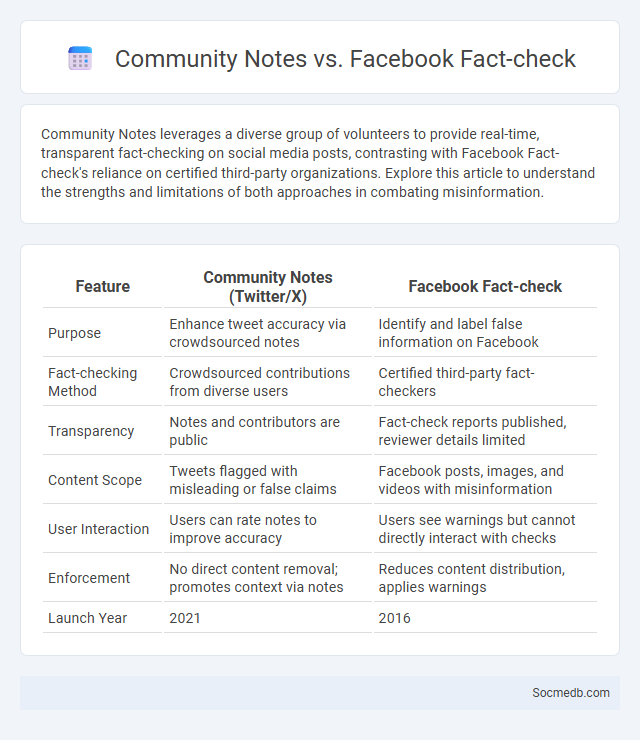
Photo illustration: Community Notes vs Facebook Fact-check
Community Notes leverages a diverse group of volunteers to provide real-time, transparent fact-checking on social media posts, contrasting with Facebook Fact-check's reliance on certified third-party organizations. Explore this article to understand the strengths and limitations of both approaches in combating misinformation.
Table of Comparison
| Feature | Community Notes (Twitter/X) | Facebook Fact-check |
|---|---|---|
| Purpose | Enhance tweet accuracy via crowdsourced notes | Identify and label false information on Facebook |
| Fact-checking Method | Crowdsourced contributions from diverse users | Certified third-party fact-checkers |
| Transparency | Notes and contributors are public | Fact-check reports published, reviewer details limited |
| Content Scope | Tweets flagged with misleading or false claims | Facebook posts, images, and videos with misinformation |
| User Interaction | Users can rate notes to improve accuracy | Users see warnings but cannot directly interact with checks |
| Enforcement | No direct content removal; promotes context via notes | Reduces content distribution, applies warnings |
| Launch Year | 2021 | 2016 |
Introduction to Community Notes and Facebook Fact-Check
Community Notes leverage user collaboration to identify and report misinformation on social media platforms, enhancing content credibility through collective verification. Facebook Fact-Check partners with independent third-party organizations to review and flag false information, promoting accurate news dissemination. Both initiatives aim to foster an informed online environment by reducing the spread of misleading content.
Understanding Community Notes: Purpose and Process
Community Notes empower you to contribute to the accuracy of information on social media by providing context to misleading or false content. The process involves users collaboratively reviewing posts, submitting notes, and rating the helpfulness of others' notes to ensure balanced and reliable perspectives. This transparent system enhances the credibility of social media platforms by promoting fact-checking and community-driven moderation.
What Is Facebook Fact-Check?
Facebook Fact-Check is a content verification process used by Facebook to reduce the spread of misinformation on its platform by partnering with independent third-party fact-checkers certified through the International Fact-Checking Network. It involves reviewing and rating the accuracy of posts, articles, and claims shared by users, then labeling false or misleading content with warnings and reducing its distribution in News Feed and Facebook Groups. This initiative supports Facebook's effort to promote trustworthy information and strengthen user confidence in the platform.
Core Differences: Community Notes vs Facebook Fact-Check
Community Notes employs a crowdsourced approach where users collaboratively add context to potentially misleading posts, enhancing transparency through collective input. Facebook Fact-Check relies on partnerships with certified third-party organizations to evaluate and label false information with official verdicts. The core difference lies in the decentralized, community-driven verification of Community Notes versus the centralized, expert-led assessment of Facebook Fact-Check.
User Participation in Both Systems
User participation drives engagement metrics in social media systems, influencing content reach and platform growth. Your interactions, such as likes, shares, and comments, create data that algorithms analyze to personalize experiences and recommend relevant content. Active involvement in multiple platforms enhances digital presence and fosters community connections, making participation a key factor in social media success.
Transparency and Accountability
Transparency and accountability in social media platforms are essential for fostering user trust and promoting ethical content management. Clear policies on data privacy, content moderation, and algorithmic decision-making ensure users understand how their information is used and how content is regulated. Regular transparency reports and mechanisms for user feedback strengthen platform responsibility and reduce misinformation.
Speed and Responsiveness to Misinformation
Social media platforms must prioritize speed and responsiveness to misinformation to protect public trust and prevent harmful consequences. Real-time monitoring systems and AI-driven fact-checking tools enable rapid identification and correction of false information. Your experience on these platforms improves significantly when misinformation is swiftly addressed and accurate content is promoted.
Impact on User Experience and Trust
Social media platforms significantly shape user experience by offering personalized content and seamless interaction, enhancing engagement and satisfaction. However, concerns about data privacy and misinformation can erode your trust, potentially leading to reduced platform usage. Transparent policies and robust security measures are essential to maintain credibility and foster positive user relationships.
Strengths and Limitations of Each Approach
Social media platforms offer targeted advertising capabilities and real-time audience engagement, enabling businesses to increase brand visibility and customer interaction. However, data privacy concerns, algorithm changes, and content saturation limit organic reach and user trust across platforms. Understanding these strengths and limitations helps optimize marketing strategies and improve overall campaign effectiveness.
Future Trends in Online Fact-Checking
Future trends in online fact-checking emphasize the integration of artificial intelligence and machine learning to enhance accuracy and speed in identifying misinformation across major social media platforms like Facebook and Twitter. Blockchain technology is being explored to create transparent and immutable records of verified content, boosting trust in digital sources. User empowerment through browser extensions and mobile apps will increase, allowing individuals to independently assess the credibility of shared information in real time.
 socmedb.com
socmedb.com